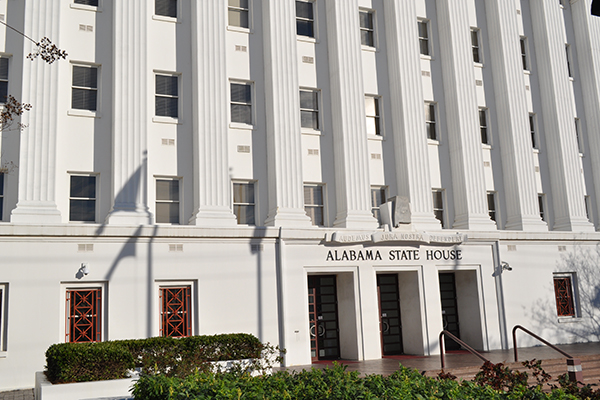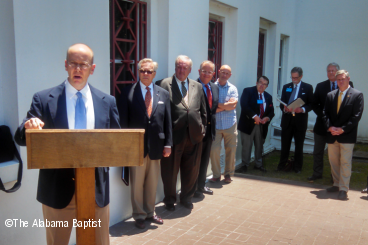If traditional paper bingo — complete with a live caller — is the only form of legal bingo in Alabama, then why do casino-style facilities with slot machine-type gambling machines continually surface under the guise of “bingo”?
Rep. Allen Farley, R-McCalla, thinks it is because there’s no real reason for them not to — the punishment for breaking the law in this case is only a misdemeanor offense and a maximum $6,000 fee. He’s ready to intensify the punishment, and he has filed House Bill (HB) 414 to make that happen.
“They can make the $6,000 in just a few hours in some locations,” said Farley, a retired Jefferson County assistant sheriff. “And with a misdemeanor, you won’t lose any rights.”
Without a deterrent, it is worth the risk of being shut down and facing these two penalties because of the amount of money the business owner can make, he said, noting the typical electronic gambling machine brings in $1,000 per day.
“If they just stay open one week, they make more than most make in a lifetime,” Farley said.
But his bill would make possession of 10 slot machines or gambling devices, possession of illegal gambling records and the promotion of and conspiracy to promote illegal gambling a felony. It also would allow law enforcement to “seize and condemn” property being used in illegal gambling and then sell it and keep the proceeds.
The “seize and condemn” option is similar to how drug busts are handled, Farley explained. When drugs are found, the law enforcement officials working the case are able to sell the items related to the drug bust if they are seized and condemned. The proceeds of what is sold go to buy law enforcement equipment, he said.
This is not true with gambling busts. And in both cases, a lot of resources, time and money go into building the case to make the busts, Farley added.
“We have not created a law. We are just putting the penalty where it should be,” he said. “We are making the penalities here the same as other offenses that affect the community in a similar way.”
Farley has 44 co-sponsors for this bill, which is in the House Judiciary Committee.
Other moral and social issues facing the state Legislature this session cover illegal drugs, abortion, human trafficking and Alabama’s policy on enforcing laws established by other states.
- Rep. Patricia Todd, D-Birmingham, filed HB25, authorizing the “medical use of marijuana” for patients “who have been diagnosed by a physician as having a debilitating medical condition.” Rep. K.L. Brown, R-Jacksonville, filed a similar bill, HB66, which he hopes will be called the Alabama Medical Marijuana Patients Rights Act and will allow the use of marijuana for patients with “a serious medical condition.” Both bills are in the House Health Committee.
- Several lawmakers filed bills attempting to further regulate the sale of ephedrine and pseudoephedrine, which are used to make methamphetamine. HB363, sponsored by Rep. Blaine Galliher, R-Gadsden, passed from the House on March 15 and now goes before the Senate, where several similar bills previously had been filed.
- Several pro-life bills also were filed at the Statehouse. A public hearing for HB112 was set for March 21. The bill, sponsored by Rep. Ed Henry, R-Decatur, would “prohibit health insurance coverage of elective abortions unless the insured has paid additional monies for a separate rider” and allow Alabama to opt out of “allowing abortion coverage by exchange participating health plans. Several similar bills also address this matter including SB10 and SB335, sponsored by Sen. Greg Reed, R-Jasper, and SB20, sponsored by Sen. Shadrack McGill, R-Scottsboro. SB10 is awaiting a third reading before the Senate. HB493, sponsored by Rep. Jack Williams, R-Birmingham, seeks to exclude ectopic pregnancies from the definition of abortion. SB12, sponsored by Sen. Clay Scofield, R-Guntersville, would require physicians to do an ultrasound and display the images to the pregnant woman before performing an abortion. It was passed from the Senate health committee and awaits a third reading. HB418, sponsored by Rep. April Weaver, R-Alabaster, and co-sponsored by 16 other representatives, also requires ultrasounds and a “verbal explanation of the ultrasound” before an abortion. The two House bills are currently in the health committee. SB6 and SB96, sponsored by Sen. Greg Allen, R-Tuscaloosa, will establish the Abortion-Inducing Drug Safety Act and make it “unlawful to administer any abortion-inducing drug to a woman without her receiving an exam by a physician.” Also, SB105 sponsored by Ward, and HB375, sponsored by Rep. Mary Sue McClurkin, R-Indian Springs, and co-sponsored by eight others, address the rights of health care professionals to refuse to perform any medical services that violate their conscience.
- HB47, also sponsored by Williams, addresses human trafficking by requiring lounges to post the National Human Trafficking Resource Center Hotline information and adds a $50 fee for every violation of this policy. The bill has passed the House and is now in the Senate Judiciary committee.
- Ward is also sponsoring SB84 to prohibit the application of foreign laws that are in violation of Alabama laws and policies. The bill passed from the Senate Judiciary committee and awaits a third reading.
Joe Godfrey, executive director of Alabama Citizens Action Program, says SB84 will strengthen public policy and could affect how or if the state recognizes activities legalized in other states like same-sex marriages but are illegal in Alabama.
Overall, Sen. Scott Beason, R-Gardendale, is pleased by the positive issues being considered at the Statehouse. He said, “The leadership is much, much more pro-family than it was a few years ago. There is a different philosophical view or bent.”




Share with others: